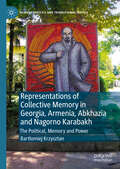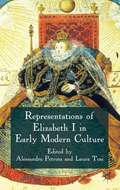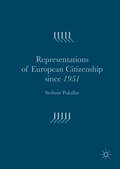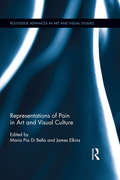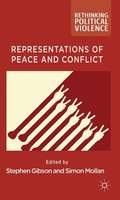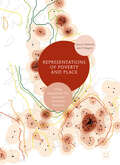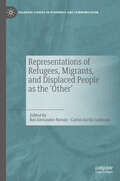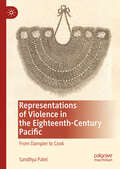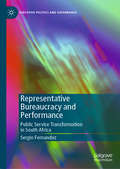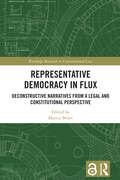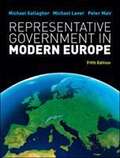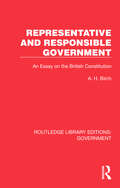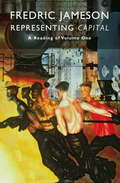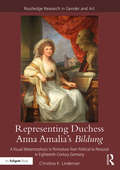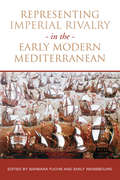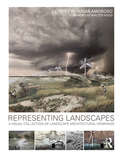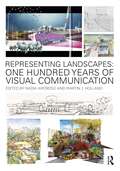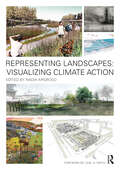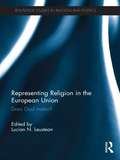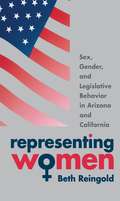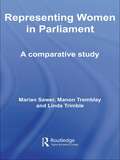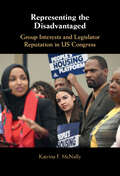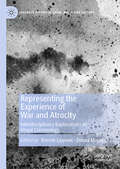- Table View
- List View
Representations of Collective Memory in Georgia, Armenia, Abkhazia and Nagorno Karabakh: The Political, Memory and Power (Memory Politics and Transitional Justice)
by Bartłomiej KrzysztanThe book is a unique proposal for an integral description of memory regimes in the South Caucasus region, covering both the independent states of Armenia and Georgia, but also the separatist entities created as a result of the turbulent changes of the early 1990s - Abkhazia and Nagorno-Karabakh. Being a transdisciplinary proposal, encompassing the perspectives of political science, history and social anthropology, the book may be of interest to researchers from different academic disciplines. At the same time, due to its narrative form, it can also be an interesting proposal for students of eastern studies, allowing for a fuller understanding of the dynamics of political change in the post-Soviet space. The comprehensive and integral approach to the issue of analysing and interpreting collective memory through the prism of its representation, presented in the form of an anthropological story based on case studies, may also be of interest to those not associated with institutional Academia.
Representations of Elizabeth I in Early Modern Culture
by Laura Tosi Alessandra PetrinaThe volume explores Elizabeth I's impact on English and European culture during her life and after her death, through her own writing as well as through contemporary and later writers. The contributors are codicologists, historians and literary critics, offering a varied reading of the Queen and of her cultural inheritance.
Representations of European Citizenship since 1951
by Stefanie PukallusThis book is a study of the multiple meanings of European citizenship, which has been represented and publicly communicated by the European Commission in five distinctive ways - Homo Oeconomicus (1951-1972), A People's Europe (1973-1992), Europe of Transparency (1993-2004), Europe of Agorai (2005-2009) and Europe of Rights (2010-2014). The public communication of these five distinct representations of European citizenship reveal how the European Commission conceived of and attempted to facilitate the development of a Civil Europe. Ultimately this history, which is based upon an analysis of public communication policy papers and interviews with senior European Commission officials past and present, tells a story about changing identities and about who we as Europeans might actually be and what kind of Europe we might actually belong to.
Representations of Pain in Art and Visual Culture: Representations Of Pain In Art And Visual Culture (Routledge Advances in Art and Visual Studies)
by James Elkins Maria Pia Di BellaThe presentation of bodies in pain has been a major concern in Western art since the time of the Greeks. The Christian tradition is closely entwined with such themes, from the central images of the Passion to the representations of bloody martyrdoms. The remnants of this tradition are evident in contemporary images from Abu Ghraib. In the last forty years, the body in pain has also emerged as a recurring theme in performance art. Recently, authors such as Elaine Scarry, Susan Sontag, and Giorgio Agamben have written about these themes. The scholars in this volume add to the discussion, analyzing representations of pain in art and the media. Their essays are firmly anchored on consideration of the images, not on whatever actual pain the subjects suffered. At issue is representation, before and often apart from events in the world. Part One concerns practices in which the appearance of pain is understood as expressive. Topics discussed include the strange dynamics of faked pain and real pain, contemporary performance art, international photojournalism, surrealism, and Renaissance and Baroque art. Part Two concerns representations that cannot be readily assigned to that genealogy: the Chinese form of execution known as lingchi (popularly the "death of a thousand cuts"), whippings in the Belgian Congo, American lynching photographs, Boer War concentration camp photographs, and recent American capital punishment. These examples do not comprise a single alternate genealogy, but are united by the absence of an intention to represent pain. The book concludes with a roundtable discussion, where the authors discuss the ethical implications of viewing such images.
Representations of Peace and Conflict
by Stephen Gibson Simon MollanThis edited volume brings together a series of contributions exploring the socio-cultural and psychological representation of peace and conflict. It ventures into areas of the humanities and social sciences not typically foregrounded in Peace Studies, such psychology, sociology, media studies, cultural studies, history, and geography.
Representations of Poverty and Place: Using Geographical Text Analysis To Understand Discourse
by Laura L Paterson Ian N GregoryThis book explores a novel methodological approach which combines analytical techniques from linguistics and geography to bring fresh insights to the study of poverty. Using Geographical Text Analysis, it maps the discursive construction of poverty in the UK and compares the results to what administrative data reveal. The analysis draws together qualitative and quantitative techniques from corpus linguistics, critical discourse analysis, Geographical Information Science, and the spatial humanities. By identifying the place-names that occur within close proximity to search terms associated with to poverty it shows how different newspapers use place to foreground different aspects of poverty (including employment, housing, money, and benefits), and how the London-centric nature of newspaper reporting dominates the discursive construction of UK poverty. This book demonstrates how interdisciplinary research methods can illuminate complex social issues and will appeal to researchers in a number of disciplines from sociology, geography and the spatial humanities, economics, linguistics, health, and public policy, in addition to policymakers and practitioners.
Representations of Refugees, Migrants, and Displaced People as the ‘Other’ (Palgrave Studies in Otherness and Communication)
by Rui Alexandre Novais Carlos Arcila CalderónThis book explores how 21st-century media-based discourses on migrants, refugees, and displaced people both reinforce and reconfigure existing negative stereotypes about these groups as 'other.' It is particularly pertinent considering the increasingly polarized world context and the evolving communication ecosystem with new media as privileged platforms for exclusionary narratives toward the ‘outgroups’ of migrants, refugees, and displaced people. The book's contributions encompass various methodologies and disciplines within communication studies, including qualitative analyses of media representations and quantitative research on public opinion. Unlike much of the existing English-language scholarship on these marginalized communities, this book de-centers North America and the UK to offer a global perspective focusing on regions such as continental and eastern Europe, the Middle East and Persian Gulf, India, China, Turkey, Russia, and Scandinavia.
Representations of Violence in the Eighteenth-Century Pacific: From Dampier to Cook
by Sandhya PatelThis book explores representations of the extensive violence that characterised British exploratory and colonising forays into the Pacific Ocean in the long eighteenth century, both between Europeans and Indigenous peoples and amongst Europeans themselves. It explores how navigators, alongside powerful commissioning bodies and editors, depicted violence in manuscripts, published texts, and iconographies, as the British negotiated competing colonial claims to Pacific spaces. In so doing, it identifies recurring and reproductive constructions of violence underpinning legitimizing imperial narratives
Representative Bureaucracy and Performance: Public Service Transformation in South Africa (Executive Politics and Governance)
by Sergio Fernandez"Representative Bureaucracy and Performance: Public Service Transformation in South Africa is a first-rate blend of quantitative and qualitative analysis of one of the major transitions in modern governance. Fernandez makes a major theoretical contribution to the literature on representative bureaucracy in demonstrating how descriptive representation translates into both active representation and better performance. His discussion of the crucial role of language and communication brings new insight to the literature on public administration and democracy."—Kenneth Meier, Distinguished Scholar in Residence, American University"This study of public sector transformation goes beyond the descriptive qualitative research largely found in South African public administration historiography by undertaking sophisticated quantitative analysis to show that representation of previously historically disadvantaged groups, under certain circumstances, can improve the performance of public organizations. This is an excellent contribution, not only to public administration scholarship in South Africa, but also to the sparse literature on public organizations in developing countries. The book should be of great value to scholars and practitioners of public administration, as well as to students of political science and organizational studies."—Robert Cameron, Professor, University of Cape Town"This book provides an excellent analysis of the theory of representative bureaucracy in the context of South African post-apartheid government. South Africa is an important and fascinating case. The work adds substantially to the literature on representative bureaucracy and will be of interest to all who are concerned with the effectiveness of government organizations."—J. Edward Kellough, Professor, University of GeorgiaGovernments throughout the world seek to promote employment equity and ensure that bureaucracies are representative of the citizenry. South Africa offers a rare and fascinating case for exploring what happens to bureaucracies as they undergo demographic transformation. Grounded in the theory of representative bureaucracy and using a mixed methods approach, this book explores how major changes in the demographics of the South African public service have affected the performance of the institution. The empirical analysis offers compelling evidence that representative bureaucracies perform better. As public organizations become increasingly representative by hiring historically disadvantaged persons, especially Africans, their performance improves, controlling for a range of factors. Evidence indicates representative bureaucracies perform better because they empathize with and advocate for historically disadvantaged communities, are equipped with linguistic and cultural competencies to serve a diverse citizenry, and can induce compliance, cooperation, and coproduction.
Representative Democracy in Flux: Deconstructive Narratives from a Legal and Constitutional Perspective (Routledge Research in Constitutional Law)
by Martin BelovThis book delves into the core of representative democracy in order to explain its main features – institutional and imaginary – and to show the reasons for its increasing dysfunctionality. The collection explores the constitutional imaginaries of representation. It outlines the main factors influencing the failures of representative democracy, in an age of constitutional crisis and transition, being gradually deconstructed via tendencies toward authoritarianism and technocracy. Special attention is devoted to the impact of the politics of fear on representative democracy. The analysis shows the main challenges stemming from national, international, transnational, and supranational technocracy produced by the increased role of administration, agencies, and courts. It exposes representative democracy as a composite phenomenon stretched between reason and emotions and between the constitutional past, present, and future. The volume will be of interest to researchers, academics, and policymakers working in the areas of constitutional law and politics, comparative constitutional law, administrative law, human rights law, and theory and philosophy of law.
Representative Government In Modern Europe
by Laver Mair GallagherFocuses on comparative European politics. This title reflects key events and changes including the impact of the world financial and economic crisis; the EU's adoption of the Lisbon Treaty; and, the election of a centreright governments in Germany and the UK.
Representative and Responsible Government: An Essay on the British Constitution (Routledge Library Editions: Government)
by A H BirchOriginally published in 1964, this book remains a seminal source for contemporary political scientists and offers exceptional insights into notions of responsibility. Wahlke (1971) describes it as ‘one of the best analytical surveys of representation.’ The book is a compact and critical essay on the British constitution which reveals the realities of British politics in the second half of the 20th Century by showing the extent to which theory and reality agree and differ.
Representing Ageing: Images and Identities
by Virpi YlänneThis collection critically examines twenty-first century representations of ageing, focusing on various media images and discourses as well as individuals' own experiences and self-presentations of ageing, drawing on innovative new empirical data.
Representing Capital
by Fredric JamesonRepresenting Capital, Fredric Jameson's first book-length engagement with Marx's magnum opus, is a unique work of scholarship that records the progression of Marx's thought as if it were a musical score. The textual landscape that emerges is the setting for paradoxes and contradictions that struggle toward resolution, giving rise to new antinomies and a new forward movement. These immense segments overlap each other to combine and develop on new levels in the same way that capital itself does, stumbling against obstacles that it overcomes by progressive expansions, which are in themselves so many leaps into the unknown.
Representing Duchess Anna Amalia's Bildung: A Visual Metamorphosis in Portraiture from Political to Personal in Eighteenth-Century Germany (Routledge Research in Gender and Art)
by Christina K. LindemanThe cultural milieu in the “Age of Goethe” of eighteenth-century Germany is given fresh context in this art historical study of the noted writers’ patroness: Anna Amalia, Duchess of Weimar-Sachsen-Eisenach. An important noblewoman and patron of the arts, Anna Amalia transformed her court into one of the most intellectually and culturally brilliant in Europe; this book reveals the full scope of her impact on the history of art of this time and place. More than just biography or a patronage study, this book closely examines the art produced by German-speaking artists and the figure of Anna Amalia herself. Her portraits demonstrate the importance of social networks that enabled her to construct scholarly, intellectual identities not only for herself, but for the region she represented. By investigating ways in which the duchess navigated within male-dominated institutions as a means of advancing her own self-cultivation – or Bildung – this book demonstrates the role accorded to women in the public sphere, cultural politics, and historical memory. Cumulatively, Christina K. Lindeman traces how Anna Amalia, a woman from a small German principality, was represented as an active participant in enlightened discourses. The author presents a novel and original argument concerned with how a powerful woman used art to shape her identity, how that identity changed over time, and how people around her shaped it – an approach that elucidates the power of portraiture in eighteenth- and early nineteenth-century Europe.
Representing Imperial Rivalry in the Early Modern Mediterranean
by Barbara Fuchs Emily WeissbourdRepresenting Imperial Rivalry in the Early Modern Mediterranean explores representations of national, racial, and religious identities within a region dominated by the clash of empires. Bringing together studies of English, Spanish, Italian, and Ottoman literature and cultural artifacts, the volume moves from the broadest issues of representation in the Mediterranean to a case study - early modern England - where the "Mediterranean turn" has radically changed the field.The essays in this wide-ranging literary and cultural study examine the rhetoric which surrounds imperial competition in this era, ranging from poems commemorating the battle of Lepanto to elaborately adorned maps of contested frontiers. They will be of interest to scholars in fields such as history, comparative literary studies, and religious studies.
Representing Landscapes: A Visual Collection of Landscape Architectural Drawings (Representing Landscapes)
by Nadia AmorosoWhat do you communicate when you draw an industrial landscape using charcoal; what about a hyper-realistic PhotoShop collage method? What are the right choices to make? Are there right and wrong choices when it comes to presenting a particular environment in a particular way? The choice of medium for visualising an idea is something that faces all students of landscape architecture and urban design, and each medium and style option that you select will influence how your idea is seen and understood. Responding to demand from her students, Nadia Amoroso has compiled successful and eye-catching drawings using various drawing styles and techniques to create this book of drawing techniques for landscape architects to follow and - more importantly - to be inspired by. More than twenty respected institutions have helped to bring together the very best of visual representation of ideas, the most powerful, expressive and successful images. Professors from these institutions provide critical and descriptive commentaries, explaining the impact of using different media to represent the same landscape. This book is recommended for landscape architecture and urban design students from first year to thesis and is specifically useful in visual communications and graphic courses and design studios.
Representing Landscapes: One Hundred Years of Visual Communication (Representing Landscapes)
by Nadia AmorosoThis volume provides an in-depth historical overview of graphic and visual communication styles, techniques, and outputs from key landscape architects over the past century. Representing Landscapes: One Hundred Years of Visual Communication offers a detailed account of how past and present landscape architects and practitioners have harnessed the power of visualization to frame and situate their designs within the larger cultural, social, ecological, and political milieux. The fifth book in the Representing Landscapes series, the presentations contained within each of the 25 chapters of this work are not merely drawings and illustrations but are rather graphic touchstones whose past and current influence shapes how landscape architects think and operate within the profession. This collected volume of essays gathers notable landscape historians, scholars, and designers to offer their insights on how the landscape has been presented and charts the development and use of new technologies and contemporary theory to reveal the conceptual power of the living medium of the larger landscape. Richly detailed with over 220 colour and black and white illustrations from some of the discipline’s best-known landscape architects and designers, this work is a ‘must-have’ for those studying contemporary landscape design or those fascinated by the profession’s history.
Representing Landscapes: Visualizing Climate Action (Representing Landscapes)
by Nadia AmorosoThis book provides an in-depth overview of graphic and visual communication styles for conveying climate change and climate action within the landscape architectural profession and in academia. The book features visualizations of climate adaptation and resilience, developed by award-winning landscape architects and academics from Canada, the United States, the United Kingdom, The Netherlands, Denmark, Germany, Italy, France, Finland, South Africa, Singapore, and China. Representing Landscapes: Visualizing Climate Action illustrates the imaginative ways in which climate action and climate resilient concepts are visually presented, communicated, and perceived. The book will be especially valuable for students and practitioners in landscape architecture, urban planning, and related fields to understand how to visually capture climate change issues and design solutions, and to deliver this message to the public.
Representing Religion in the European Union: Does God Matter? (Routledge Studies in Religion and Politics)
by Ed. Leustean Lucian N.Religious actors are becoming part of the EU bureaucratic system, and their mobilisation in Brussels and Strasbourg in the last decade has increased dramatically. This book explores the mechanism and impact of religious representation by examining relations between religious practitioners and politicians in the European Union from the Second World War until today. This book seeks to answer the following questions: How do (trans)national religious groups enter into contact with European institutions? What are the rationale and the mechanisms of religious representation in the European Union? How are religious values transposed into political strategies? What impact has relations between religious practitioners, EU officials and politicians on the construction of the European Union? Examining religious representation at the state, transnational and institutional levels, this volume demonstrates that ‘faith’ is becoming an increasingly important element of the decision-making process. It includes chapters written by both academics and religious practitioners in dialogue with European institutions and will be of great interest to students and scholars of European politics, history, sociology of religion, law and international relations.
Representing Women
by Beth ReingoldWomen in public office are often assumed to "make a difference" for women, as women--in other words, to represent their female constituents better than do their male counterparts. But is sex really an accurate predictor of a legislator's political choices and actions? In this book, Beth Reingold compares the representational activities and attitudes of male and female members of the Arizona and California state legislatures to illuminate the broader implications of the election and integration of women into public office. In the process, she challenges many of the assumptions that underlie popular expectations of women and men in politics.Using in-depth interviews, survey responses, and legislative records, Reingold actually uncovers more similarities between female and male politicians than differences. Moreover, the stories she presents strongly suggest that rather than assuming that who our representatives are determines what they will do in office, we must acknowledge the possibility that the influence of gender on legislative behavior can be weakened, distorted, or accentuated by powerful forces within the social and political contexts of elective office.
Representing Women in Parliament: A Comparative Study (Routledge Research in Comparative Politics #Vol. 14)
by Manon Tremblay Marian Sawer Linda TrimbleThe first book-length treatment of the political representation of women in countries with parliamentary systems based on the Westminster model. Written by a major international team of authors, this new study features twelve chapters on both new and established parliaments, including Australia, Canada, New Zealand and the United Kingdom. It tests the latest theories about women's political representation within Westminster style assemblies and is organized into three key sections that: examine the extent to which the descriptive representation of women in the ‘old’ Westminster parliaments has progressed in recent years, and the factors which have enhanced or impeded development. explore the relationship between the numbers of women elected and the substantive representation of women – or the extent that women ‘act for’ women. review the recent experiences of four ‘new’ Westminster parliaments (Northern Ireland, Scotland, Wales and Nunavut) and evaluate the political opportunities for women provided by the creation of new institutions. This new comparative study will be of great interest to students and researchers of legislative studies and of gender politics and gender studies.
Representing the Advantaged
by Daniel M. ButlerPolitical inequality is a major issue in American politics, with racial minorities and low-income voters receiving less favorable representation. Scholars argue that this political inequality stems largely from differences in political participation and that if all citizens participated equally we would achieve political equality. Daniel M. Butler shows that this common view is incorrect. He uses innovative field and survey experiments involving public officials to show that a significant amount of bias in representation traces its roots to the information, opinions, and attitudes that politicians bring to office and suggests that even if all voters participated equally, there would still be significant levels of bias in American politics because of differences in elite participation. Butler's work provides a new theoretical basis for understanding inequality in American politics and insights into what institutional changes can be used to fix the problem.
Representing the Disadvantaged: Group Interests and Legislator Reputation in US Congress
by Katrina F. McNallyThe limited attention Congress gives to disadvantaged or marginalized groups, including Black Americans, LGBTQ, Latinx, women, and the poor, is well known and often remarked upon. This is the first full-length study to focus instead on those members who do advocate for these groups and when and why they do so. Katrina F. McNally develops the concept of an 'advocacy window' that develops as members of Congress consider incorporating disadvantaged group advocacy into their legislative portfolios. Using new data, she analyzes the impact of constituency factors, personal demographics, and institutional characteristics on the likelihood that members of the Senate or House of Representatives will decide to cultivate a reputation as a disadvantaged group advocate. By comparing legislative activism across different disadvantaged groups rather than focusing on one group in isolation, this study provides fresh insight into the tradeoffs members face as they consider taking up issues important to different groups.
Representing the Experience of War and Atrocity: Interdisciplinary Explorations in Visual Criminology (Palgrave Studies in Crime, Media and Culture)
by Emma Murray Ronnie LippensThis book explores how the experience of war and related atrocities tend to be visually expressed and how such articulations and representations are circulated and consumed. Each chapter of this volume examines how an image can contribute to a richer understanding of the experience of war and atrocity and thus they contribute to the burgeoning field of the "criminology of war". Topics include the destruction of war in oppositional cultural forms - comparing the Nazi period with the ISIS destruction of Palmyra - and the visual aesthetics of violence deployed by Jihadi terrorism. The contributors are a multi-disciplinary team drawn mainly from criminology but also sociology, international relations, gender studies, English and the visual arts. This book will advance this field in new directions with refreshing, original work.
